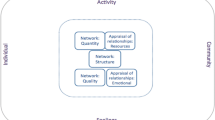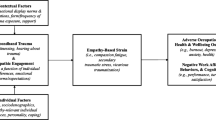Abstract
The aim of the study was to test the Finances-Shame model and its explanatory power regarding the prevalence of psychosocial ill-health. The Finances-Shame model postulates that (i) the greater the financial stress and the more experiences of having been shamed, the greater the risk for psychosocial ill-health, (ii) the lesser the financial stress and the fewer experiences of having been shamed, the lower the risk for psychosocial ill-health. The study was based upon a survey carried out during the period March 2000–May 2000 in a mid-Swedish region (n = 5,666). The response rate was 69%. The results of the study supported the hypotheses.


Similar content being viewed by others
References
Arcel, L. T. (1985). Skam og selvmordsforsog hos en pubertetspige [Shame and suicide attempt of pubertygirl]. Psyke & Logos, 6, 25–58.
Aronsson, G., Dallner, M., Lindh, T., & Göransson, S. (2005). Flexible pay but fixed expenses: Personal financial strain among on-call employees. International Journal of Health Services, 35(3), 499–528.
Berkman, L. F., & Syme, L. S. (1979). Social networks, host resistance and mortality: A nine-year follow-up study of Alameda County residents. American Journal of Epidemiology, 109(2), 186–204.
Brown, G. W., Harris, T. O., & Hepworth, C. (1995). Loss, humiliation and entrapment among women developing depression: A patient and non-patient comparison. Psychological Medicine, 25, 7–21.
Cooley, C. H. (1902/1922). Human nature and the social order. New York: Scribner’s.
Collins, R. (1990). Stratification, emotional energy and the transient emotions. In T. D. Kemper (Ed.), Research agendas in the sociology of emotions. New York: State University of New York Press.
Collins, R. (2004). Interaction ritual chains. Princeton: Princeton University Press.
Dickerson, S. S., Gruenewald, T. J., & Kemeny, M. F. (2004). When the social self is threatened: Shame, physiology and health. Journal of Personality, 72(6), 1191–1216.
Elder, G. H., Jr., & Caspi, A. (1988). Economic stress in lives: Developmental perspective. Journal of Social Issues, 44(4), 25–45.
Gallo, L. C., & Matthews, K. A. (2003). Understanding the association between socioeconomic status and health: Do negative emotions play a role? Psychological Bulletin, 129, 10–51.
Gilbert, P. (1998). What is shame? Some core issues and controversies. In P. Gilbert & B. Andrews (Eds.), Shame: Interpersonal behavior, psychopathology and culture. New York: Oxford University Press.
Goldberg, D. P. (1972). The detection of psychiatric illness by questionnaire. Oxford: Oxford University Press.
Hagquist, C. (1998). Economic stress and perceived health among adolecents in Sweden. Journal of Adolescent Health, 22, 250–257.
Horwitz, A. V. (1984). The economy and social pathology. Annual Review of Sociology, 10, 95–119.
Ilstad, S. (1989). Okonomisk stress hos familier: Årsaker, virkninger of mestring [Economic stress among families: Causes, effects and copying]. Tidskrift for Norsk Psykologforening, 26, 238–244.
Kawachi, I., & Kennedy, B. P. (1997). The relationship of income inequality to mortality—Does the choice of indicator matter? Social Science and Medicine, 45, 1121–1127.
Kawachi, I., Kennedy, B. P., Lockner, K., & Protow-Stith, D. (1997). Social capital, income inequality and mortality. American Journal of Public Health, 97, 1491–1498.
Kemper, T. D. (1990). Social relations and emotions: A structural approach. In T. D. Kemper (Ed.), Research agendas in the sociology of emotions. New York: State University of New York Press.
Kendler, K. S., Hettema, J. M., Butera, F., Gardner, C. O., & Prescott, C. A. (2003). Life event dimensions of loss, humiliation, entrapment, and danger in the prediction of onsets of major depression and generalized anxiety. Archives of General Psychiatry, 60, 789–796.
Kessler, R., Turner, J., & House, J. (1987). Intervening processes in the relationship between unemployment and health. Psychological Medicine, 17(4), 949–961.
Kubzansky, L. D., & Kawachi, I. (2000). Affective states and health. In L. F. Berkman & I. Kawachi (Eds.), Social epidemiology. Oxford: Oxford University Press.
Lundberg, O., & Fritzell, J. (1995). Income distribution, income change and health. In Economic change, social welfare and health in Europe (Vol. 54, pp. 37–58). WHO-Euro.
Marmot, M. (2004). Status syndrome. London: Bloomsbury.
Neckel, S. (1991). Status und Scham – Zur symbolischen Reproduktion sozialer Ungleichheit [Status and shame—On the symbolic reproduction of social inequality]. Frankfurt: Campus.
Neckel, S. (1996). Inferiority: From collective status to deficient individuality. The Sociological Review, 44(1), 17–34.
Östberg, V. (2001). Hälsa och välbefinnande. In J. O. Jonsson, V. Österberg, M. Evertson, & S. Brolin Låftman (Eds.), Barns och ungdomars välfärd. Antologi från Kommittén Välfärdsbokslut, Stockholm (SOU 2001:55).
Pihl, A., & Starrin, B. (1998). Ekonomiska påfrestningar, socialt stöd och ohälsa [Financial hardship, social support and ill-health]. Socialmedicinsk tidskrift, 75(6), 297–304.
Rantakeisu, U., Starrin, B., & Hagquist, C. (1999). Financial hardship and shame—A tentative model to understand the social and health effects of unemployment. The British Journal of Social Work, 29(6), 877–901.
Retzinger, S. M. (1991). Violent emotions. Shame and rage in marital quarrels. London: Sage Publications.
Scheff, T. J. (1990). Microsociology. Discourse, emotion, and social structure. Chicago: The University of Chicago Press.
Scheff, T. J. (1992). Emotion and illness: Anger, bypassed shame and heart disease. Perspectives on Social Problems, 3, 117–134.
Scheff, T. J. (2001). Shame and community: Social components in depression. Psychiatry, 64(3), 212–224.
Scheff, T. J. (2003). Shame in self and society. Symbolic Interaction, 26(2), 239–262.
Sennett, R. (1999). Corrosion of character. London: W.W. Norton & Company.
Sennett, R., & Cobb, J. (1972). The hidden injuries of class. New York: Vintage.
Shreve, B., & Kunkel, M. A. (1991). Self-psychology, shame, and adolescent suicide: Theoretical and practical considerations. Journal of Councelling & Development, 69, 305–311.
Smith, A. (1776/1999). The wealth of the nations. London: Penguin Books.
Starrin, B., & Jönsson, L. R. (2006). The Finances-Shame model and the relation between unemployment and health. In T. Kieselbach, A. Winefield, C. Boyd & S. Anderson (Eds.), Unemployment and health. Brisbane: Australian Academic Press.
Starrin, B., Rantakeisu, U., & Hagquist, C. (1997). In the wake of the recession—economic hardship, shame and social erosion. Scandinavian Journal of Work and Environment, 23, 47–54.
Starrin, B., KalanderBlomkvist, M., & Janson, S. (2003). Socialbidragstagande och statusbunden skamkänsla – En prövning av ekonomi-sociala band modellen [Social assistance and status-bound shame—Testing the Finances-Shame model]. Socialvetenskaplig Tidskrift, 1(10), 24–27.
Turner, J. B. (1995). Economic context and the health effects of unemployment. Journal of Health and Social Behavior, 36(3), 213–229.
Underlid, K. (1992). Arbeidslaus [Unemployed]. Oslo: Det Norske Samlaget.
Weich, S., & Lewis, G. (1998). Poverty, unemployment and common mental disorders: Population based cohort study. British Medical Journal, 317, 115–119.
Vinokur, A. D., Price, R. H., & Caplan, R. D. (1996). Hard times and hurtful partners: How financial hardship affects depression and relationship satisfaction of unemployed persons and their spouses. Journal of Personality and Social Psychology, 71(1), 166–179.
Whelan, C. T. (1992). The role of income, life-style deprivation and financial hardship in mediating the impact of unemployment on psychological distress: Evidence from the Republic of Ireland. Journal of Occupational and Organizational Psychology, 65(4), 331–344.
Wilkinson, R. G. (1992). The impact of income inequality on life expectancy. British Medical Journal, 304, 165–168.
Wilkinson, R. G. (1999a). Income inequality, social cohesion and health: clarifying the theory. A reply to Muntaner and Lynch. International Journal of Health Services, 29(3), 525–543.
Wilkinson, R. G. (1999b). Health, hierarchy and social anxiety. Annals of the New York Academy of Sciences, 896, 48–63.
Wilkinson, R. G. (2002). Putting the picture together: Prosperity, redistribution, health, and welfare. In M. Marmot & R. G. Wilkinson (Eds.), Social determinants of health. Oxford: Oxford University Press.
Wilkinson, R. G. (2005). The impact of inequality—How to make sick societies healthier. New York: The New York Press.
Author information
Authors and Affiliations
Corresponding author
Rights and permissions
About this article
Cite this article
Starrin, B., Åslund, C. & Nilsson, K.W. Financial Stress, Shaming Experiences and Psychosocial Ill-Health: Studies into the Finances-Shame Model. Soc Indic Res 91, 283–298 (2009). https://doi.org/10.1007/s11205-008-9286-8
Received:
Accepted:
Published:
Issue Date:
DOI: https://doi.org/10.1007/s11205-008-9286-8




